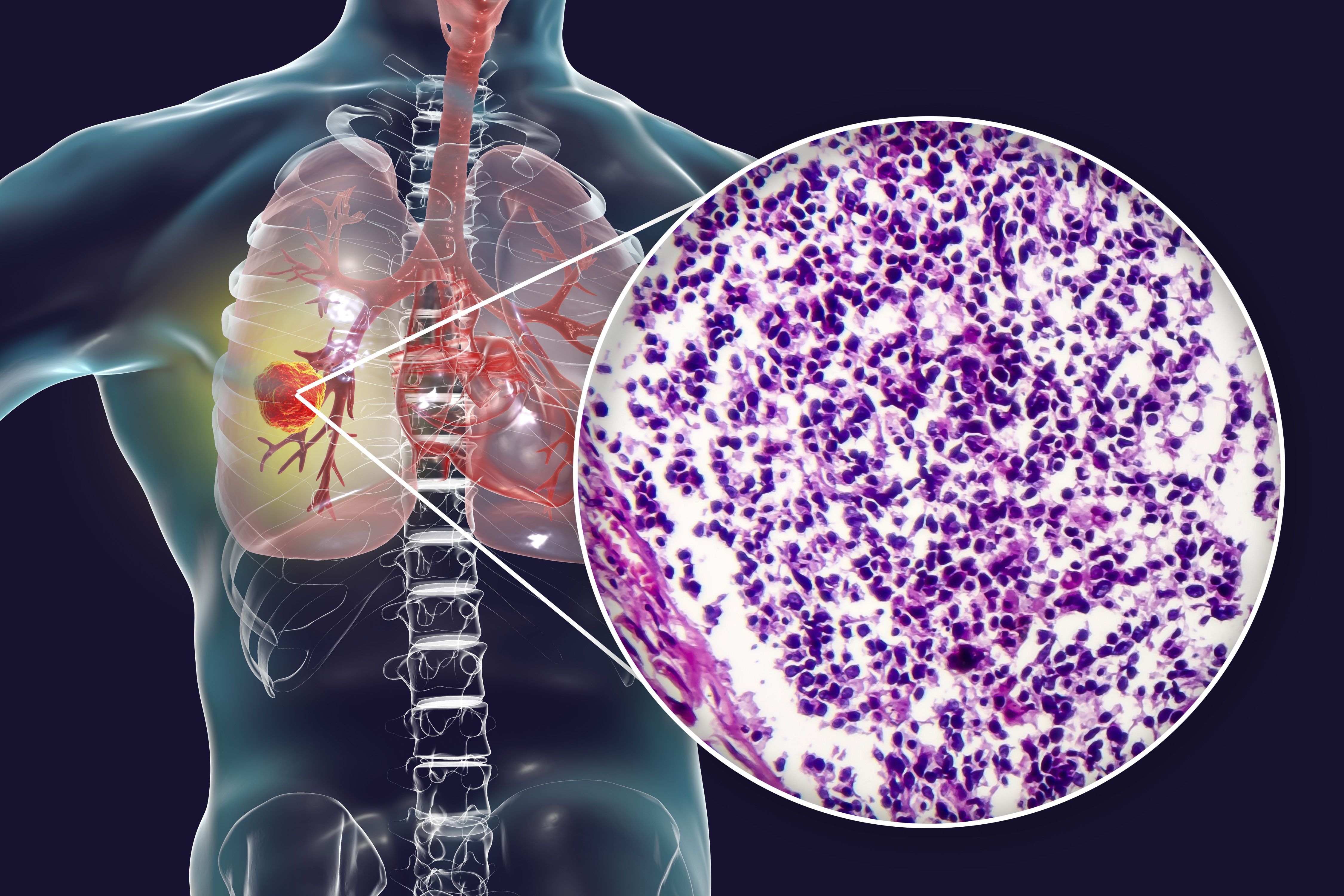Neoadjuvant Adagrasib With or Without Nivolumab May Better pCR Rates in NSCLC
The phase 2 Neo-KAN study revealed neoadjuvant adagrasib alone or in combination with nivolumab may improve pathologic complete response rates in patients with resectable, KRAS G12C–mutated non–small cell lung cancer.

The rationale for the phase 2 Neo-KAN study (NCT05472623) reveals that neoadjuvant adagrasib (MRTX849) as monotherapy or in combination with nivolumab (Opdivo) may improve pathologic complete response (pCR) rates in patients with resectable, KRAS G12C–mutated non–small cell lung cancer (NSCLC), according to presentation at 2022 IASLC World Conference on Lung Cancer.1
Over half of patients with resectable NSCLC relapse after surgery when receiving standard systemic therapies, and more than 13% of patients with nonsquamous NSCLC have KRAS G12C–driven disease.
Adagrasib, a KRAS G12C inhibitor, has displayed a 43% objective response rate and an 80% disease control rate in previous studies in pretreated, advanced NSCLC. Preclinical data have shown that this agent reconditions the tumor microenvironment to increase antitumor immune activity, and, when combined with PD-1 inhibitors, increases rates of durable response.
Additionally, neoadjuvant therapy presents several benefits when compared with adjuvant therapy, including earlier treatment of micrometastatic disease, the opportunity for pathologic treatment response assessment, a limited duration of drug exposure, and the opportunity for surgical prehabilitation. NSCLC clinical trials have also demonstrated an association between pCR and event-free survival (EFS) after neoadjuvant therapy.
“[The aim of Neo-KAN is] to assess the safety and efficacy of neoadjuvant adagrasib alone and in combination with [the PD-1 inhibitor] nivolumab in resectable KRAS G12C–mutant NSCLC,” lead study author Susan Combs Scott, MD, a thoracic medical oncologist with the Johns Hopkins Sidney Kimmel Comprehensive Cancer Center at Sibley Memorial Hospital and an assistant professor of oncology at the Johns Hopkins School of Medicine, and coauthors wrote in a poster outlining the study design.
Eligible patients include those who are newly diagnosed with resectable, stage IB to IIIA, KRAS G12C–mutated NSCLC. Patients must also have an EGOC performance score of 0 or 1.
This prospective, open-label trial will run across 12 sites in North America and will sequentially enroll 42 patients to 2 cohorts, for a total of 21 patients in each cohort. Cohort A will receive adagrasib at 600 mg twice daily for 42 days. Cohort B will receive adagrasib at 400 mg twice daily for 42 days, along with nivolumab at 240 mg every 2 weeks for 3 doses. Each cohort will then receive surgery within 3 to 14 days after concluding the neoadjuvant regimens, followed by standard-of-care post-operative systemic therapy of the treating oncologist’s choice. All patients will be evaluable, regardless of whether they receive surgery. A total of 20 patients per arm are expected to receive surgery.
The primary end points of this trial will be pCR rate, defined as the number of surgical resection specimens with no residual viable tumors divided by the total number of patients in each arm who received treatment; safety, defined as the incidence of treatment-related adverse effects and the rate of peri- and post-operative complications; and feasibility, defined as the completeness of surgery, delayed or canceled surgery, or a change in surgical approach. Bayesian-designed stopping rules that use a beta prior distribution will be implemented for feasibility and safety. Secondary end points will include EFS, overall survival, and major pathologic response rate, defined as having 10% or less of a residual viable tumor.
This study will investigate whether the enrolled patients’ pCR rates exceed 2.5%, which is the predicted response rate with chemotherapy. An alternative hypothesis states that either arm will achieve a pCR rate of at least 20%. If the sample size is 21 in each arm, the type I error rate will be less than 5%, with 82% power.
A descriptive correlative analysis will also be conducted, with the objective of comprehensively evaluating genomic and immunologic features of response and resistance to treatment. This analysis will also explore the pharmacodynamic markers of immune modulation in blood and tumor tissue before and after treatment. The biospecimens in this correlative study will include tissue biopsies taken before treatment, paired resection specimens taken after treatment, and longitudinal blood samples. This analysis will be conducted through whole-exome sequencing, TCR sequencing, multiplex immunohistochemistry, MANAFEST, and longitudinal plasma circulating tumor DNA analysis.
This trial is expected to open for enrollment on November 20, 2022.2
References
Scott SC, Hu C, Smith KN, et al. Phase 2 trial of neoadjuvant KRASG12C directed therapy with adagrasib (MRTX849) with or without nivolumab in resectable NSCLC (Neo-KAN). Presented at: 2022 IASLC World Conference on Lung Cancer; August 6-9, 2022; Vienna, Austria. Poster EP02.04-007
Neoadjuvant KRAS G12C directed therapy with adagrasib (MRTX849) with or without nivolumab (Neo-KAN). ClinicalTrials.gov. Updated July 25, 2022. Accessed August 5, 2022. https://clinicaltrials.gov/ct2/show/NCT05472623